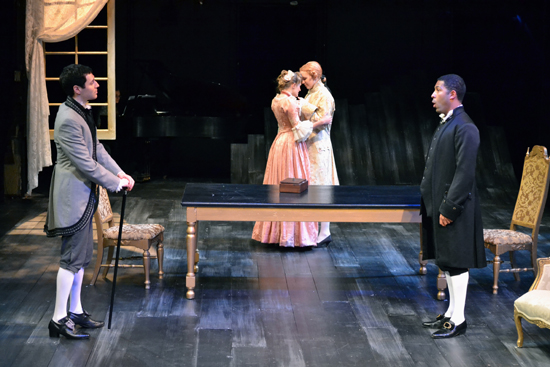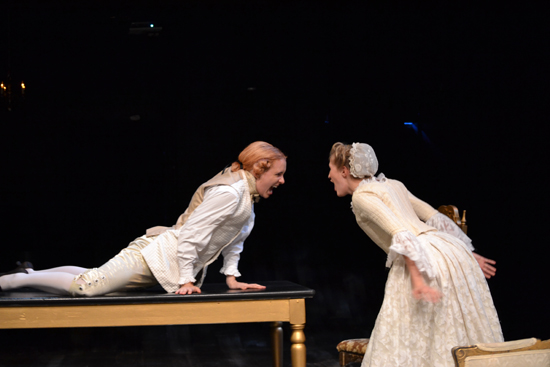Fringe Festival: One Story, Three Lenses
CFA marries opera, theater to explore Dumas tale

Mark Tempesta (CFA’13) (from left), Katrina Galka (CFA’13), Lauren Lyles (CFA’13), and Benjamin Taylor (CFA’13) will perform the one-act opera Le Portrait de Manon, the first piece in CFA’s annual Fall Fringe Festival. Photos by Oshin Gregorian
Since its first publication in 1848, Alexander Dumas’ novel Lady of the Camellias has spawned tearjerkers in every genre, from stage adaptations to Giuseppe Verdi’s beloved opera La Traviata to a classic Hollywood film starring Greta Garbo.
The College of Fine Arts 16th Annual Fall Fringe Festival: The Ladies of the Camellias is offering three variations on the Dumas story of doomed romance between a frail, consumptive, but passionate courtesan and the country nobleman who tries to save her. First up is the rarely staged Jules Massenet opera Le Portrait de Manon, followed by British playwright Pam Gems’ contemporary take on the tale in the drama Camille, and ending with a concert performance of La Traviata, woven with excerpts from Gems’ play. The Fringe Festival begins tomorrow, October 6, and runs through October 26.
“We are so fortunate in the BU Fringe Festival to be able to study the same story from three points of view,” says Judy Braha (CFA’08), a CFA assistant professor of directing and acting and head of the MFA in directing program, who is directing the Gems play and is a co–stage director of La Traviata.
This year’s festival “explores the richly iconic character of Camille in iterations of Dumas’ Marguerite and his contemporary adaptor Pam Gems alongside Verdi’s enduring rendition of the character in his Violetta,” says Jim Petosa, director of the CFA School of Theatre. “Additionally, through the exploration of Massenet’s Manon, our artists and audiences receive a rare opportunity to discover her anew and in depth.”

Le Portrait de Manon is a one-act sequel to Massenet’s earlier, widely acclaimed 1884 opera Manon. “It was written about 10 years after the main opera and is haunted by scenes from the original,” says Allison Voth, a CFA associate professor and Opera Institute principal coach, who is music director and pianist for the “charming little one-act.” The cast’s quartet includes the original character from Manon—the courtesan Marguerite’s lover in the original Dumas story—as an older man. The opera is “so beautifully written for the voice that the singers can really concentrate on the characters and the text,” says Voth. In Portrait, the original besotted nobleman of Manon, now morose and wistful, at first deplores, but eventually yields to his young nephew’s betrothal to a girl of modest birth and means. “Massenet is almost like the Puccini of French opera, in that Puccini was extremely specific in his musical articulation, and reflects beautifully what the singer is singing about,” says Voth. “Massenet is a great dramatist in the French style.”
David Gately is the guest director of Le Portrait de Manon, which features one man and three women, one of whom portrays a man in what is known in opera as a pants role. It runs 40 minutes and contains spoken dialogue, “a real challenge for the students,” says Voth. Gately’s long list of directing credits includes recent productions of Madama Butterfly with the Seattle Opera, La Bohème with Florida Grand Opera, and A Midsummer Night’s Dream with the Florentine Opera and Glimmerglass Opera.
Referred to by the Los Angeles Times as “Camille with an attitude,” Gems’ stage adaptation refocuses the Dumas fils tragedy on “social and economic placement and the futile ambition to transcend it,” says Braha of the play, which Gems, who died in 2011, wrote “in the midst of Thatcher’s England,” according to Braha. Gems “was very interested in the dilemma of women under the thumb of the commercial machine and how they discovered ways to survive, even thrive,” she says.
Gems’ retelling of the story of the doomed Marguerite and Armand becomes a reflection on the nature of love, and is layered with themes of revenge, self-interest, and the attachment of a price to all human contact. A memory play, Camille plays out Marguerite’s life as a roller-coaster ride, says Braha, one “that at times feels like we go through tragedy, comedy, and farce to find our way back to tragedy. Everyone in the play is attempting to trick fate in some way.”

The Camille story, she notes, is timeless. It’s about “falling in love with the wrong person, weathering the disapproval of our parents, struggling to undo the past and forge a brighter future for ourselves, and facing our own mortality.” This year’s Fringe Festival affords “a wonderful opportunity to expose the BU community and the community at large to these distinctly different works of art in a consolidated way,” says Braha, noting that in the past it hasn’t always been easy to present works with a unified theme. The festival will culminate in a concert performance of Verdi’s La Traviata, conducted by William Lumpkin, a CFA associate professor, with scenes from the Gems play. The Traviata performance is part of The Spirit of Verdi, CFA’s yearlong bicentennial tribute to the composer.
Launched in 1997, the Fall Fringe Festival was established to attract a broader audience for opera at BU with unconventional fare. Fringe Festival productions are a collaborative effort that brings together directors, singers, actors, and designers from BU’s School of Music, Opera Institute, and School of Theatre.
All Fringe Festival productions tie into CFA’s keyword initiative, now in its second year. The 2012–2013 initiative, focusing on the word resilience, will explore the buoyancy of the human spirit in times of war, tragedy, hardship, suffering, and oppression.
All Fringe Festival performances are at the BU Theatre, 264 Huntington Ave., Boston. Le Portrait de Manon will be performed at the Lane-Comley Studio 210, on Saturday, October 6, at 2 and 8 p.m. (followed by talk-back), and Sunday, October 7, at 2 and 7 p.m. Camille is at the Lane-Comley Studio 210 on Saturday, October 13, at 2 (followed by a talk-balk) and 8 p.m., Sunday, October 14, at 2 p.m. (followed by talk-back), Wednesday, October 17, at 7:30 p.m., Thursday, October 18, at 7:30 p.m., Friday, October 19, at 8 p.m., and Saturday, October 20, at 2 and 8 p.m. La Traviata will be performed on the mainstage on Friday, October 26, at 8 p.m. Tickets are $7 general admission; one free ticket with BU ID, subject to availability. Purchase tickets here or call 617-933-8600. To get to the BU Theatre, take the T Green Line E trolley to Symphony or the Orange Line to Mass Avenue.
Comments & Discussion
Boston University moderates comments to facilitate an informed, substantive, civil conversation. Abusive, profane, self-promotional, misleading, incoherent or off-topic comments will be rejected. Moderators are staffed during regular business hours (EST) and can only accept comments written in English. Statistics or facts must include a citation or a link to the citation.